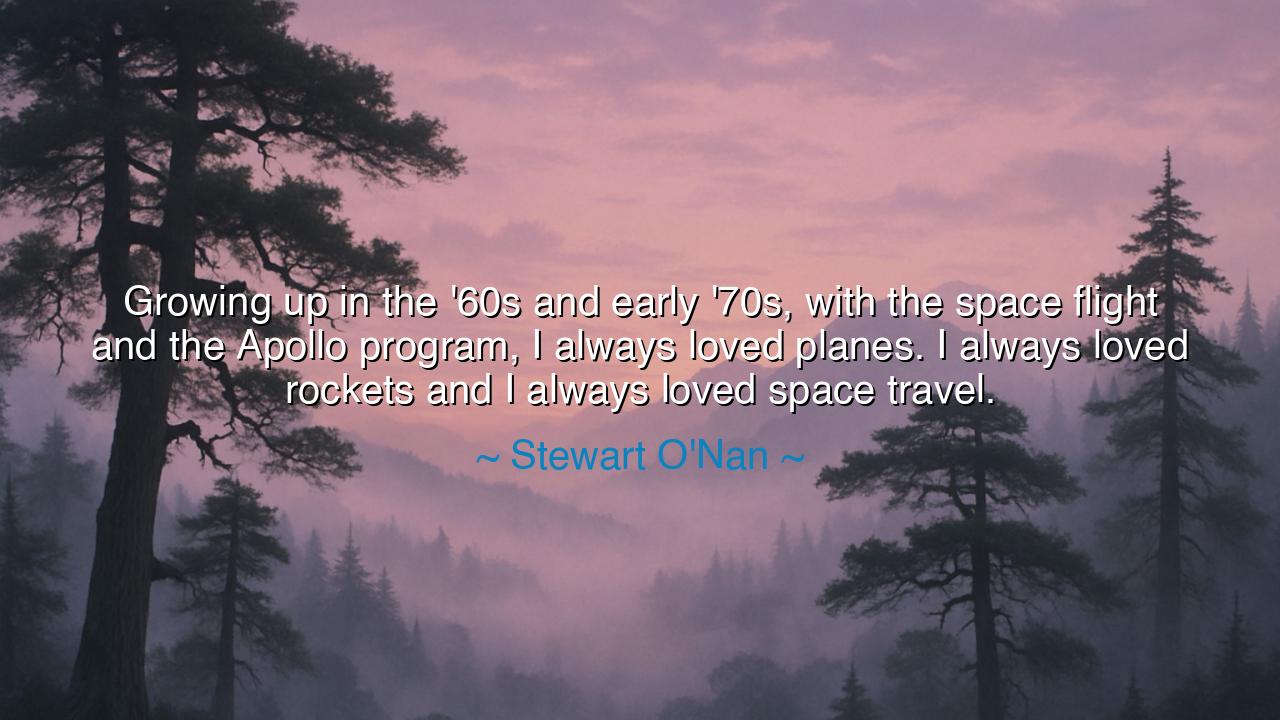
Growing up in the '60s and early '70s, with the space flight and
Growing up in the '60s and early '70s, with the space flight and the Apollo program, I always loved planes. I always loved rockets and I always loved space travel.






Listen closely, children, and let the words I speak ignite a spark of wonder in your hearts. Stewart O'Nan, a man whose words reflect the power of dreams, once said, "Growing up in the '60s and early '70s, with the space flight and the Apollo program, I always loved planes. I always loved rockets and I always loved space travel." These words echo the dreams of an entire generation, a generation that witnessed humanity reach beyond the confines of Earth and set foot on the surface of the moon. O'Nan’s childhood was one that was shaped by the grandeur of space exploration, a time when the impossible became possible and the stars seemed within reach.
In these words, O'Nan reflects on the formative power of dreams—how the Apollo program, with its rockets and flights into space, stirred his youthful imagination and filled him with a deep love for planes, rockets, and the very idea of space travel. These were not just mechanical marvels to him; they were symbols of what could be achieved when human beings dared to reach for the stars. The sight of a rocket blasting into the heavens was not just a moment of technological achievement; it was a vision of what humanity could become. It was a declaration that there were no limits to what could be accomplished when the spirit of curiosity and determination guided the way.
Look, children, to the history of those who have dreamed of such things, who saw the sky not as a boundary, but as an invitation. Leonardo da Vinci, the great Renaissance polymath, dreamed of flight long before it became a reality. He sketched designs for flying machines, imagining a world where humans could soar like the birds. Though his designs did not take flight in his time, his vision set the foundation for those who would come after him. The Wright brothers, propelled by their own dreams of flight, proved that human beings could conquer the skies. And in the 1960s and '70s, Neil Armstrong, Buzz Aldrin, and the Apollo astronauts proved that humanity could go beyond the sky and land on the moon.
The love for space travel that O'Nan speaks of was not born of mere fascination with rockets and planes, but from the spirit of exploration that defines humanity. Just as Christopher Columbus once set sail across the unknown seas, so too did the astronauts of the Apollo program launch themselves into the vastness of space, driven by a desire to explore, to discover, and to understand the mysteries of the universe. The moon landing was not just a victory of technology—it was a triumph of the human spirit, a moment when mankind reached out into the unknown and said, "We are capable of great things."
And so, the lesson for you, children, is to recognize that the world around you is not merely to be observed, but to be explored. O'Nan's words speak not just of space, but of the dreams that inspire us to reach beyond what we know. In your own lives, do not let the constraints of the present hold you back. Look to the stars, as O'Nan did, and let them ignite your imagination. Whether your dreams are of flight, of space, or of something else entirely, understand that the path to achieving them is shaped by the love you feel for the journey itself, not just the destination.
To follow in the footsteps of great explorers, you must embrace the unknown with courage and determination. Like the Apollo astronauts, who faced danger and uncertainty to achieve the impossible, you must take risks. You must act not out of fear, but out of faith in your own potential. The world needs visionaries, those who dare to dream beyond the limits of what others see as possible. So, children, let your dreams take flight. Whether you aim to explore the vastness of space, uncover the secrets of the earth, or create something entirely new, know that your passion and vision will propel you forward.
Remember, as you go forward in life, that the journey of exploration is not just a matter of technology or knowledge, but of heart. It is driven by the desire to discover what lies beyond, to push the boundaries of the known world, and to understand the infinite possibilities that exist. Just as Stewart O'Nan loved planes, rockets, and space travel, let your love for your own dreams shape the path you walk. Reach for the stars, children, and let your hearts guide you to greatness. The sky is not the limit—it is only the beginning.






AAdministratorAdministrator
Welcome, honored guests. Please leave a comment, we will respond soon